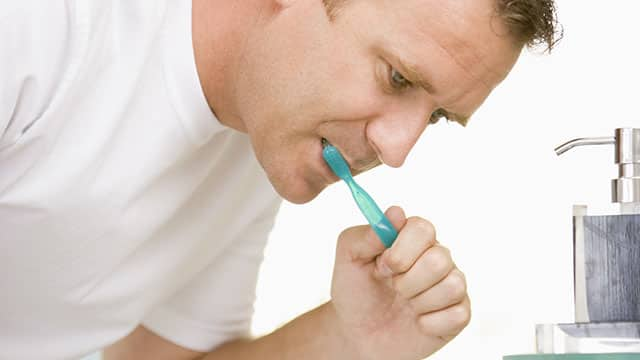Causes of gum swelling
There are a few common causes of gum inflammation that may fit your circumstances. Here are some of the most common causes of gum swelling:
- Gingivitis: The main cause of swollen gums is gingivitis. If you haven't been brushing and flossing well, this may be the issue.
- Medications: If you’ve recently started taking medication, your swollen gums may be a side effect of the drug. Talk to your doctor about your side effects to the medication and find out if there are alternatives.
- Brand switch: If you’ve recently changed your brand of toothpaste or mouthwash, you may be having a reaction to one of the ingredients.
- Poor nutrition: Vitamin C deficiency can cause inflamed gums, so if you haven't been eating fruits and vegetables, your diet could be to blame.
- Tooth extraction: Gum swelling after tooth extraction is normal – it usually appears in the first 48 hours after your procedure and can last around 5-7 days.
- Getting braces: Braces and gum swelling can be linked if the braces are new or have just been adjusted. It can also be a sign of an underlying problem like gingivitis, so it’s worth getting checked at the dentist.
There are many other possible causes and contributors to gum inflammation, so discussing your symptoms with your dentist is the best way to get an accurate diagnosis.
How long does gum swelling last?
Gum swelling is quite common and, if it goes away on its own after a day or two, it’s not a cause for concern. However, if the swelling lasts for more than 2 days, it could be a sign of a more serious problem like gum disease or an infection. If you have any other symptoms like a fever, see your dentist as soon as possible.
How to get relief from gum swelling
If you’re wondering what to do for gum swelling, here are a few dos and don’ts that can ease your discomfort:
Do:
- Brush and floss regularly. If the root cause of your gum swelling is gingivitis, good oral hygiene is the first step to recovery.
- Improve your diet. Add some extra fruits and vegetables to your diet and avoid caffeinated beverages and sodas for a while
- Rinse your mouth with a salt water solution. This can ease the pain of inflamed gums.
- See your dentist! Be sure to make an appointment if your gum irritation persists. A dental professional can determine the exact cause of the swelling, and help you improve the health of your teeth and gums faster.
Don't:
- Don't continue to use toothpastes and mouthwashes that irritate your gums. Mouthwash that contains alcohol may irritate swollen gums. Change your toothpaste if you find it’s hurting the affected area.
- Don't use alcohol and tobacco, since both those substances can irritate your gums further.
- Don't ignore the problem. Begin taking action to help reduce the swelling and see a professional to ensure the swelling in your gums isn't a symptom of something more serious.
How to prevent gum swelling
The best way to prevent gum swelling is to stick to a good oral care routine. Brush your teeth twice a day using a soft-bristled toothbrush and don’t forget to clean between your teeth and along the gumline using interdental brushes or floss. Take extra care with cleaning if you have braces, as you’ll have more hard-to-reach areas. Avoid too many sugary drinks and treats, alcohol and smoking if you can.
How to treat swollen gums
If you’re experiencing gum swelling and haven’t had a chance to visit your dentist yet, there are a few things you can try. Here’s what to do for swollen gums at home:
- Brush your teeth and floss gently so you don’t irritate your gums more.
- Use a toothpaste or mouthwash that’s designed to promote gum health and protect against cavities.
- Swish with a saltwater rinse to get rid of any bacteria in your mouth.
- Drink lots of water – this will encourage saliva production and also rinse away bacteria.
- Avoid irritants like smoking, alcohol and mouthwash that contains alcohol.
- Use a hot compress for pain and a cold compress for swelling – you can alternate between the two.
This article is intended to promote understanding of and knowledge about general oral health topics. It is not intended to be a substitute for professional advice, diagnosis or treatment. Always seek the advice of your dentist or other qualified healthcare provider with any questions you may have regarding a medical condition or treatment.
ORAL HEALTH QUIZ
What's behind your smile?
Take our Oral Health assessment to get the most from your oral care routine
ORAL HEALTH QUIZ
What's behind your smile?
Take our Oral Health assessment to get the most from your oral care routine











